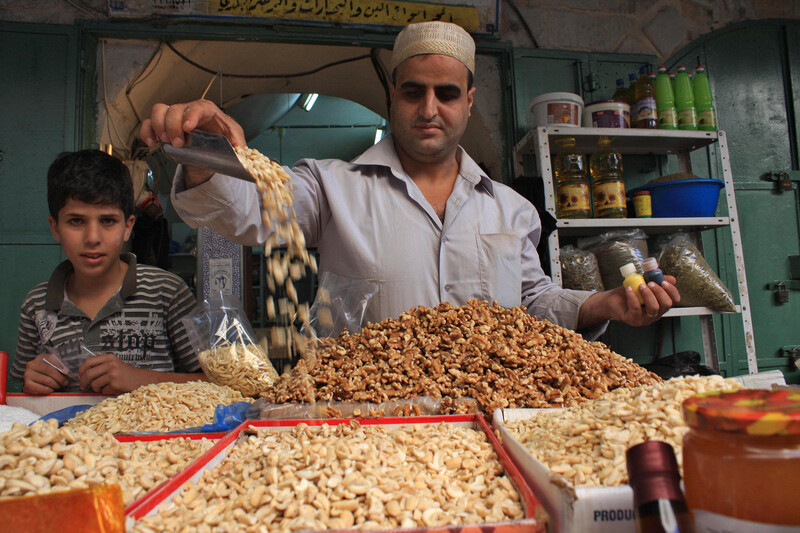The Electronic Intifada Ramallah 23 August 2011

Economic woes are affecting Palestinian families’ abilities to put food on the table for Ramadan.
MaanImagesRAMALLAH (IRIN) - Palestinian families are facing increasing financial woes this Ramadan, as the Palestinian Authority (PA) juggles with its dwindling budget.
August salary payments for the PA’s estimated 150,000 employees, about half in the West Bank and half in the Gaza Strip, arrived late and it is unclear when September payments will arrive.
“The PA’s financial situation has deteriorated due to shortfalls in donor financing, and revenue collection has been lower than budgeted,” Udo Kock, the International Monetary Fund (IMF) representative in Jerusalem, said.
“Mostly Arab donors are not paying,” Ghassan Khatib, spokesman for PA prime minister Salam Fayyad’s office, said.
Foreign donations account for just over a quarter of the total Palestinian budget of $3.7 billion used to pay salaries and for other public spending.
The PA budget has been missing about $35 million monthly in donor payments since the start of the year, said Khatib. He estimated the total unpaid amount since January to be about $300 million.
According to the PA finance ministry, between January and July, 33 percent of required external budget support has been spent, instead of the 58 percent that should have been spent during this period.
Saudi Arabia made a partial payment of $30 million in July. Saudi Arabia and the United Arab Emirates are the largest Arab donors to the PA.
Experts say Arab nations have been focused on other concerns since the January uprising erupted in Egypt, and crises in other parts of the Arab world, like Libya and Syria.
Cutbacks to Ramadan meals
“Last year my family had two or three types of food on our iftar [daily meal to break the Ramadan fast] table and now we barely have enough,” said Mohammed Musa, a 48-year-old guard at a municipal building in Ramallah and a PA employee.
His monthly salary of about $460 supports a family of ten living in Amari refugee camp in Ramallah, which has high unemployment and a population of about 10,000.
In response to the crisis, PA President Mahmoud Abbas ordered PA institutions to stop holding official Ramadan iftar dinners and to divert the allocated funds to poor Palestinians.
Several public and private institutions followed suit, like telecommunications company Paltel Group, the largest private sector company in the West Bank and Gaza.
Wael Qadan, director of planning with the Palestinian Red Crescent Society (PRCS), said: “In response to Abbas’s request, PRCS cancelled the iftar meal for businesspeople and redirected the funds — about $20,000 — to our emergency budget.” These funds (about $35,000) are used to assist Palestinians with medical care, education fees, and home building, he said.
According to Fayyad’s office, the PA social affairs ministry has a fund of about $223,000 from the Emirates Red Crescent which is being spent on Ramadan meals for 12,000 individuals in the West Bank and Gaza, and new clothing for the holiday.
No money to spend
Palestinian families and businesses say they are feeling the pressure.
“I am selling a quarter of what I sold last Ramadan,” said cafeteria owner Amjad Baker, 28 years old from Ramallah, as he prepared qatayef, a traditional pancake-like holiday sweet.
“The economy is down, aid is not coming in, and people do not have money to spend,” said Amjad.
He said new elections should be held.
The PA’s current financial crisis is being exacerbated by uncertainty surrounding the potential Palestinian bid for statehood at the UN in September, and the outcome of a reconciliation agreement between Palestinian factions Fatah in the West Bank and Hamas in Gaza.
Salaries for the estimated 25,000-30,000 military and civilian employees of the Hamas-led government in Gaza will be paid in full after delays over the past eight months, a Gaza official who preferred anonymity said.
“The Gaza government collects $10-12 million in local revenue, and the rest of the government operating budget [estimated at about $30-35 million, according to Hamas officials interviewed by IRIN in 2010] comes from outside sources,” said the official.
There may be additional delays, said the official, mostly related to logistical problems in receiving the funds due to political upheaval in the region.
Meanwhile, iftar tables in Gaza are often barren, power cuts are frequent and nearly half the population lacks a guaranteed access to adequate nutrition, according to the World Food Program.
This item comes to you via IRIN, a UN humanitarian news and information service, but may not necessarily reflect the views of the United Nations or its agencies. All IRIN material may be reposted or reprinted free-of-charge; refer to the copyright page for conditions of use. IRIN is a project of the UN Office for the Coordination of Humanitarian Affairs.


